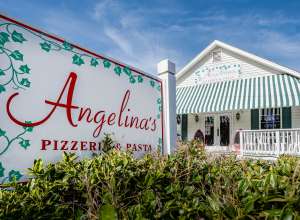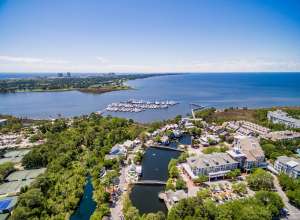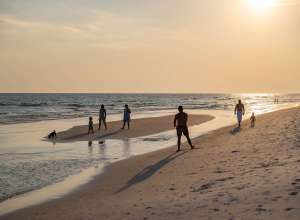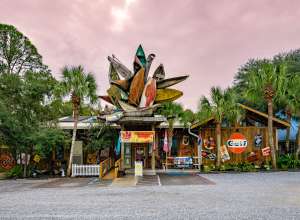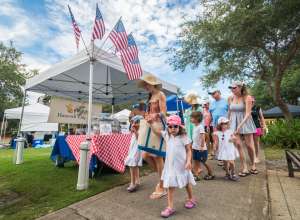Story
Montessori School Flourishes in Point Washington
November 5, 2010 by Joyce Owen

School drop-off and pick-up times are a hectic blur of kids stumbling out of cars in the morning and hours later dashing back in to head home. At South Walton Montessori Academy these are also times to make crucial connections.
On a crisp fall afternoon teachers Catherine Beall, Natalie Jobling and David Hopkins carefully manage the pick-up line. They chat with moms and dads, pet family dogs and share tidbits about the day, just like family members.
“That is a key element, the school is really a second home,” says parent Tracy Baranowski, whose two children have attended SWMA since its inception in 2004.
In the morning, parents can tell one of the teachers if a child is a bit grumpy, “got up on the wrong side of the bed,” says Beall who is Head of School and Lead Elementary Teacher. With the information, the teacher can stop to give the child a hug, tackling the problem head on.
“We confront issues and help the children learn to manage conflict,” she says.
In the afternoon, children are encouraged to greet mom or dad and to share the happenings of their day.
It is a key aspect of the Montessori philosophy that the staff and parents are partners in raising the children. It’s almost a lifestyle, Beall says, where everyone works together to do what’s best to help each child become a well-rounded global citizen.
“There is no way I could raise my girls to become the citizens they need to become without having additional ‘mothers’ and ‘fathers’ to guide them,” Baranowski says.
“To be most successful in a Montessori program, it is important that the families of the students fully support the program,” says parent Miriam Dillon, who served on the board of trustees for five years and has a son at the school. “It is challenging to create a strong, independent learner at school if mom and dad are constantly doing everything for their child at home. I have learned that it is amazing what my child can do and learn if I just get out of his way and let him go.
“We have never given our son a reward for getting all his spelling words correct or mastering a new concept – his rewards are intrinsic. He feels good about himself when he has worked hard for something and has mastered it,” Dillon says.
“This is another big Montessori concept – intrinsic rewards. My son starts each day with his work plan in front of him and works through it at his own pace. Each child has his or her own plan. The teachers provide individual lessons on new works and check over each subject as it is completed that day. Every day he gets independent, one on one interaction with his teacher. If he doesn’t finish his work plan for that day, then he must bring it home and complete it for homework,” she says.
“The independence that is fostered in the children from an early age creates a high level of self-esteem and adaptability. Transitioning from Montessori to another educational approach or school is just another ‘new work.’”
The teachers know every child and all the parents, Beall says. Families are the foundation of the Montessori program. There are multi-age classes at the South Walton school – currently toddler, primary, lower elementary and upper elementary – with a three-year age span that is similar to many families. But unlike a family where one is always the oldest, middle and youngest child, the ranking changes each year.
For Beall, providing the opportunity to experience the different roles for a year is a critical aspect of the learning that takes place.
Also having a child for three years gives the teacher the ability to know everything about that child, including what will motivate them to learn. The older children often help the younger ones, which Beall says is an indication of the learning that takes place – “I know a lesson is learned when they teach it to another child.”
“Probably the single biggest difference between the Montessori approach and our area schools is that Montessori is child centered education,” says Dillon. “Montessori asks, ‘What does this particular child need to be successful in learning?’ and then a program is developed for that child. In most traditional educational environments the child must adapt to a teacher led curriculum. Both have been successful approaches, our family just happens to prefer the Montessori approach,” Dillon says.
Montessori is a structured program that gives children freedom with limits. There are three main rules at the school: respect yourself, respect others and respect the environment. But when those three rules are followed, there's little need to create other rules. Beall explains, “We don’t have to say, ‘don’t run’ because the friends know that if you run you could hurt yourself, someone else or damage someone else’s work, so they don’t run.”

As a private school, funding is a critical part of continuing the program. Some children might not be able to attend the school without financial assistance. Beall says one third of the students receive assistance.
Torre Rosa is one of the most important fundraisers for the school. It is already scheduled for May 13, 2011 and will be held at WaterSound Beach Club again. Last year the $20,000 raised was earmarked for enrichment and financial assistance.
Since its founding in 2004, the school has its highest enrollment this year with 65 students. There has been an ebb and flow in the number of students, but Beall says the turnover rate is about average for Montessori programs. And now there are plans to add seventh grade.
“We wanted to get comfortable with this,” Beall says. “Get a good reputation. We wanted to be good at what we do before adding another grade.”
But as parents ask about the possibility, it seems the time is right. There is room at the school, although they will have to enclose a much-loved upstairs porch, Beall is prepared for the addition. She anticipates the class will be small, under 10 students, but also says, “We are playing it by ear as to the number of students, we will be flexible.”
The school was originally located in Rosemary Beach and though the move was not one that was anticipated, it has been a blessing. The Montessori program is based on learning in a home-like setting and now the school is in a converted home and separate cottage in Point Washington built by Peter and Susan Horn. It is located on a wooded lot with giant oaks and magnolias bordering Eden Gardens State Park. The last part of the drive to the school is down a tree-lined lane.
Dillon was on the board when the school relocated and says, “The new location is absolutely ideal and a great move. We have much more space and it is just so serene – a very conducive environment for learning. Nature is a big part of a Montessori curriculum. My son, another student and I were sitting in front of the school one morning when a mother deer and her baby fawn slowly walked passed us. I’m not sure it gets more magical than that!”






